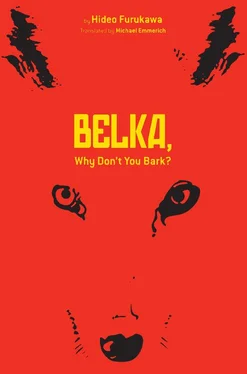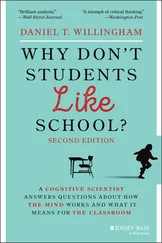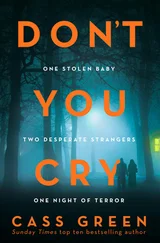Day by day, month by month, the front lines, the territory where you worked, shifted further to the west, toward Afghanistan’s border with Pakistan.
And at last, Guitar, we come to the fourth year. Exactly four years had passed. December 1979. Four years since you and Goodnight had become mother and child. You and your mother, and of course your alter ego, the Hellhound, and the alter ego of the Hellhound’s right-hand man in Mexico, the younger of the two Samoan twins, left the North-West Frontier Province to come even further west, to the FATA. To the region the Pashtuns administered themselves. You would never forget this land. You would never forget the FATA’s hilly terrain.
Because this was where your mother would die.
Goodnight.
Listen. Looking back, you can see how fickle your mother’s fate had been. In 1967, she had been denied the chance to go and fight on the battlefields of the Indochina peninsula with her brother DED. She played no role in the Vietnam War. Southeast Asia had nothing to do with her life. Now, in 1979, here you both were in Central Asia. You and your mother were standing in the Pashtuns’ traditional homeland. A line just like the one that had split Vietnam into North and South had divided the Pashtuns. You and your mother were on the front lines. Your mother was about to be swept up in the Afghan Wars.
To die in the Afghan Wars.
A little more Afghan political history. The few months leading up to December 1979. All of Afghanistan had plunged into civil war. The confusion the mujahideen had bred was exacerbated by power struggles within the communist government itself. The president placed great faith in the Soviet Union, but the second in command—the deputy prime minister—was more of a nationalist. A nationalist communist. He was focused on the potential negative effects of reforms carried out too suddenly and decided it would be advisable to loosen restrictions on religious freedom—restrictions, that is, that had been placed on Afghanistan’s traditional, local forms of Islam. Hoping to establish Afghanistan’s independence from the Soviet Union, he secretly initiated communications with the United States Embassy in Kabul. The president, working with members of the Soviet intelligence team, plotted to assassinate him. The plot was put in action on September 14, but the deputy prime minister struck back with help from the Afghan army and intelligence agency. The president was taken prisoner. On September 16, his resignation was announced, and the deputy prime minister became the president. A few days later, the former president was “taken care of.” And so the elimination of the pro-Soviet faction within the government began.
A purge.
Yet another purge.
And once again, adrift from the USSR.
Far from ending the civil war, this actually worsened it. December 1979. You, Guitar, were on the Pakistan side of the Pashtun homeland. You had come with your mother and your alter ego and your alter ego’s bodyguard’s alter ego. A first transaction took place, then a second. On December 25, the Soviet army moved south at a number of different points over the twelve-hundred-mile border with Afghanistan. It invaded Afghanistan’s territory. This was actually the start of the Afghan War, although it took some time for that information to radiate around the country. That same day, you participated in a third transaction. In the days leading up to the war, a few different mujahideen organizations had hosted your master. On December 27, Soviet special forces attacked the Tajbeg Presidential Palace in Kabul. The Afghan president was killed. The USSR immediately established a puppet government. It installed a new leader to replace the old one. On the afternoon of December 29, Kabul fell. Antigovernment forces had been laying their own plans since before the USSR began its “direct intervention,” and the Soviet occupation gave them, in effect, the go sign. At the same time, Guitar, you watched as your master entered into negotiations with a powerful commandant from a mujahideen group, a member of the Ghilzai tribe—also part of the Pashtun confederacy. That was a very busy day. The commandant kept getting calls on his radio. In the end, he and your master decided to arrange another meeting in a remote region even further west in the FATA, almost on the border with Afghanistan. There were four opium purification factories there, disguised as ordinary brick houses, belonging to the commandant. And so the next evening, that’s where you were. Your mother too. And your master—your alter ego. The Samoan had some business to take care of and hadn’t come. He had gone to a smuggling base near Peshawar the day before and would be joining up with you again the next day.
So the Hellhound, your master and alter ego, had no bodyguard.
And so it happened.
Go on, you tell it.
ME?
Sure.
I SAW IT.
You saw it?
I SAW IT. I SAW MY MOTHER DIE. SAW THAT VILLAGE ON THE BORDER BECOME THE PLACE WHERE MY MOTHER DIED. I SAW IT.
What did you see first?
A… CAR.
That’s right. It was a truck, actually, with a canvas tarp. It arrived that evening in the village near the western border of the FATA. That evening—the evening of December 30, 1979. The word TOYOTA was printed on the back. Not that you could read it.
I COULDN’T READ IT. BUT I HATED IT.
You hated the Toyota?
YES.
As well you should have. Because, Guitar, the man who would shoot your mother was soon to emerge from it. At first, everyone assumed it was just another transport truck. They thought it was one of theirs. As a matter of fact, the truck itself was being used by the commandant of the mujahideen organization your master was currently negotiating with. It was supposed to be full of freshly harvested poppy fruit and hashish. The commandant wanted to show your master, the Hellhound, what they could produce. You were going to be part of that scene too. You would smell the raw materials, then accompany them to the factory, where you would smell the finished products…
I NEVER GOT TO DO ANYTHING.
No, you didn’t.
PEOPLE JUMPED OUT OF THE TRUCK. THEY HAD GUNS.
Soviet-made guns. Kalashnikovs. About a dozen men leapt out of the canvas-covered back of the truck, each one carrying a Kalashnikov. They were Pashtuns, but they weren’t from this area. Neither were they part of the organization the commandant ran, with this village as one of his bases. They were Pashtuns in the Afghan army, obeying top-secret orders from the new government—a government that was, of course, no more than a Soviet puppet. The USSR believed it was essential to maintain stability in Afghanistan, now that it had taken control, and that meant thoroughly clamping down on the movements of all antigovernment forces. It meant crushing the mujahideen. Crushing the jihad. They had a list. Twenty-three leading figures in four organizations were named. The third from the top was the commandant. The list included his true name and seven aliases.
SO THAT WAS IT?
That was it.
THAT’S WHY THEY CAME?
That’s why they came. And they came quickly. They had been ordered to execute their man before the new year. Ordered by the new government—by those who stood behind the new government. These Pashtuns, members of the Afghan government’s army, had formed an assassination squad, and then, on the Afghanistan-Pakistan border, they had seized that Toyota you hated. And now here they were, in the village.
I SAW THEM. THEY HAD GUNS.
That’s right. And whom were they aiming them at? The commandant, standing dumbstruck, taken completely by surprise… yes, the commandant of the mujahideen organization. But not only him. Also your master.
AND ME.
And your mother.
YES! MY MOTHER! MY MOTHER!
Читать дальше












